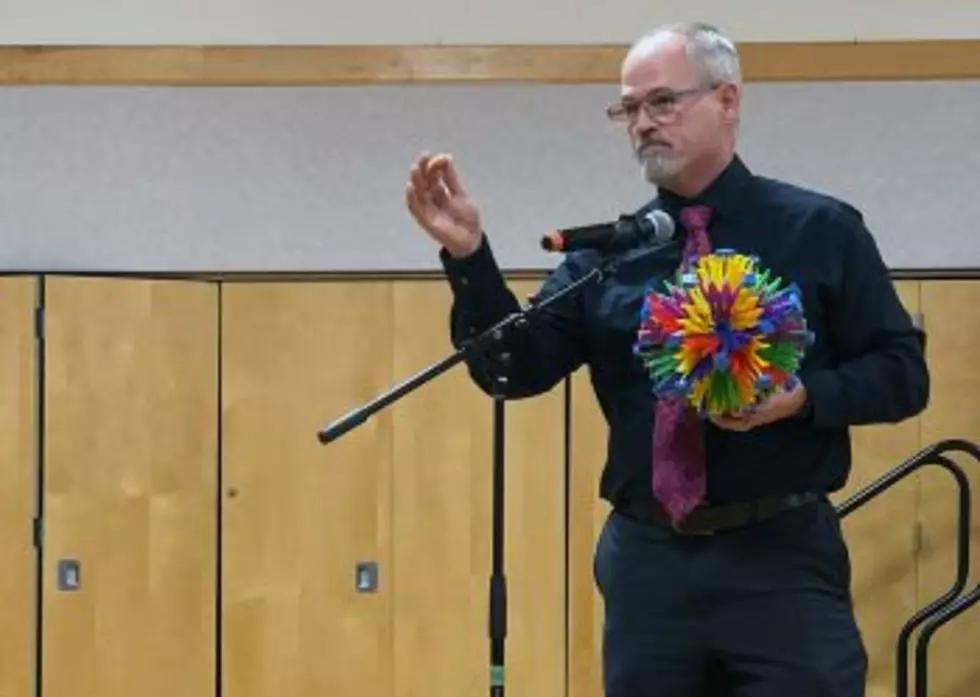
In Bannon’s absence, UM rally celebrates Universal Declaration of Human Rights
At a human rights rally at the University of Montana on Tuesday night, professor Tobin Miller Shearer walked up to the microphone with a ball bearing in one hand and an expandable toy ball in the other.
The ball bearing, small and hard, represented white nationalism and the alt-right movement in the U.S. The toy ball represented the UN's Universal Declaration of Human Rights – an overarching document adopted by the United Nations General Assembly in 1948.
As Shearer pulled the colorful ball apart, he said the declaration lists all the rights humans share, regardless of race, sex, religion, or any other status. That includes the right to equality before the law, a fair public hearing, asylum from persecution, and the freedom of belief and religion.
“It promotes freedom of expression,” said Shearer, director of African-American studies at UM. “It states as a baseline the need for all people to have access to public services. The Universal Declaration of Human Rights is everything white nationalism is not.”
Tuesday's rally celebrated the 70th anniversary of the declaration and addressed white-nationalism and the alt-right. The event was held in place of the recently canceled debate with conservative provocateur Stephen Bannon.
The former White House Chief Strategist was supposed to participate in an academic debate on populism with former UM professor Michel Valentin. The event was canceled by its organizers last week.
UM President Seth Bodnar said the university cannot ban speakers based on content and viewpoint, but will always ensure campus safety.
“There have been and will be in the future speakers on campus who express views that do not align with our core beliefs. I want you to know that allowing these individuals to speak on campus is not an endorsement of their views,” Bodnar said.
“Rather, it is an affirmation of our commitment to the free expression of a diversity of ideas. And we must acknowledge that our belief in the right of all to express their views may sometimes result in the airing of ideas with which we disagree vehemently and that challenge our efforts to foster an inclusive campus.”
Many at Tuesday's rally, including Montana Human Rights Network co-director Rachel Carroll Rivas, were happy with the debate’s last minute cancellation and decided to use the reserved space for the rally.
Bannon was also chairman of Breitbart News before he stepped down in January, which was a platform for hard-edged nationalist ideas.
“Steve Bannon represents so much of the current situation in which extremist ideas that were once on the margins have made their way into the mainstream and to the highest echelons of political office in the United State, in particular having been part of the effort to advance the alt-right in the media,” said Carroll Rivas.
Speakers from a number of organizations, including the Jeanette Rankin Peace Center and the University of Montana Black Student Union, talked about the importance of diversity and open-mindedness.
Joel Kambale, a member of the International Rescue Committee from the Democratic Republic of Congo, said military unrest in the mid-1990s in the country proves that education on human rights in every part of the world is still needed.
“When there’s no peace, there’s no human right,” he said.
Alice Boyer with Kyiyo, or the Native American Student Association, talked about stereotypes and the misconceptions associated with tribal cultures.
She referenced an old photo taken of a group of teepees in the Missoula Valley with a caption stating it was a Native American encampment. The tribe that created the camp should be mentioned as well, she said.
“On a tribal level, we often think of Native Americans as being one big cohesive group versus Native Americans being different tribal affiliations and cultures and their own sovereign governments as well,” Boyer said.
Betsy Mulligan-Dague, director of the Jeanette Rankin Peace Center, said hate comes from fear, and combating fear takes persistence and building the future to be different.
“We can continue to work toward peace and human dignity that we all want, but it’s going to take all of us, doing everything we can even when it’s not easy, and especially when we’re called to understand and live with those who hate,” Mulligan-Dague said.
With the current political climate, it was important to hold a rally as an alternative to Bannon’s visit, Carroll Rivas said. It’s an important time to celebrate the declaration formed after World War II and remind others that immigrants, people of different nationalities, upbringings and abilities have rights as well.
“We will not be divided, human rights are united,” she said.
University of Montana history student Jolie Scribner said she was surprised at the announcement of Bannon’s visit back in October. It proved that no one is isolated from nationalist ideologies, she said.
“It was sort of an awakening that people like that can come to where I’m at and that I’m not so far removed from Washington D.C. that these ideas aren’t able to reach me all the way out in Missoula, Montana,” she said.
